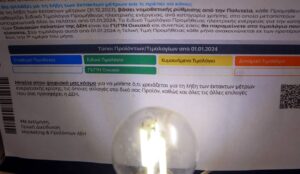From the beginning of 2025, a new regulatory framework will significantly change the daily lives of property owners, businesses and taxpayers. With the central goal of digital modernization and enhanced transparency, the new tax code brings changes to rent payments, transactions through the IRIS system, property management, violation penalties and property taxation.
Rent payments only electronic: End of cash transactions
One of the most significant changes concerns rent payments, which from 2025 must be made compulsorily through the property owner’s bank account, which must be declared to the tax authority. Payment of rent in cash or any other non-electronic method will no longer be recognized by the state. If this procedure is not followed, then:
- The property owner will not be able to deduct related expenses.
- The tenant loses the right to receive subsidies or benefits related to housing.
- If it concerns commercial property, the expense will not be deductible from business costs.
IRIS: Heavy fines for non-compliance
Significant changes are also coming to the IRIS electronic payment system. From 2025, all businesses must be able to accept direct payments through this channel. Otherwise, heavy fines are imposed, reaching 20,000 euros for businesses with double-entry books and 10,000 euros for single-entry books. Exceptions are provided only for small settlements and islands with fewer than 3,100 inhabitants – unless they are tourist destinations.
New property registry: Complete recording and transparency
The tax authority is proceeding with the creation of the Property Ownership and Management Registry (POMR). This will consolidate all relevant information for each property: from its description and use to the rights that accompany it and its management. The registry will be updated automatically through citizen declarations and integration with other databases.
Shock penalties for transport without receipts
The fight against illegal product transportation takes on a stricter character. From June 2, 2025, fines for transport without receipts increase tenfold: from 500 euros to 5,000 euros for single-entry books and from 1,000 to 10,000 euros for double-entry books. The goal is substantial deterrence of violations through strong disincentives.
Real-time transport monitoring
A modern cargo and vehicle control system is also being activated, operating at customs, ports and country entry-exit points. Through technologies such as license plate recognition cameras and X-ray machines, the route and cargo of each transport will be monitored. If discrepancies are detected, customs and judicial authorities will be immediately notified.
Non-dom: Tax incentives for investors and families
The alternative taxation regime (non-dom) becomes more flexible. Now, the investor’s family members can join at any time within the 15-year period, at a cost of 20,000 euros per person. Additionally, complete exemption from gift and inheritance taxes is provided for assets abroad.
Tax exemptions for medical expenses from employers
Medical expenses paid by employers for employees or their family members will no longer be considered income and are not subject to gift tax, thus strengthening corporate social responsibility.
Return of Greeks from abroad with fewer obstacles
For Greeks abroad who want to return, the time limit for staying abroad is reduced so that movable property is exempt from inheritance tax. From 10 years, the requirement is reduced to 5 years of continuous residence.
SDOE and OPEKEPE integrated into the tax authority
Aiming for better control coordination, SDOE and OPEKEPE now come under tax authority supervision, with transfer of all responsibilities, personnel and equipment. Additionally, fines from 10,000 to 100,000 euros are imposed on entities that don’t cooperate or delay data transmission.
New control system for trucks and containers
Finally, the tax authority operates an integrated monitoring system for commercial vehicles and containers, with fixed and mobile control systems, cameras, barriers and special access cards. Its operation will cover both land borders and ports, thus strengthening control against smuggling.
In conclusion, the new regulatory framework for 2025 changes the landscape in taxation and transactions. Electronic payments, digital transparency, and strengthened controls are expected to affect both individuals and businesses. Adapting to new obligations is inevitable – but simultaneously an opportunity for better organization, compliance and utilization of available tax tools.




